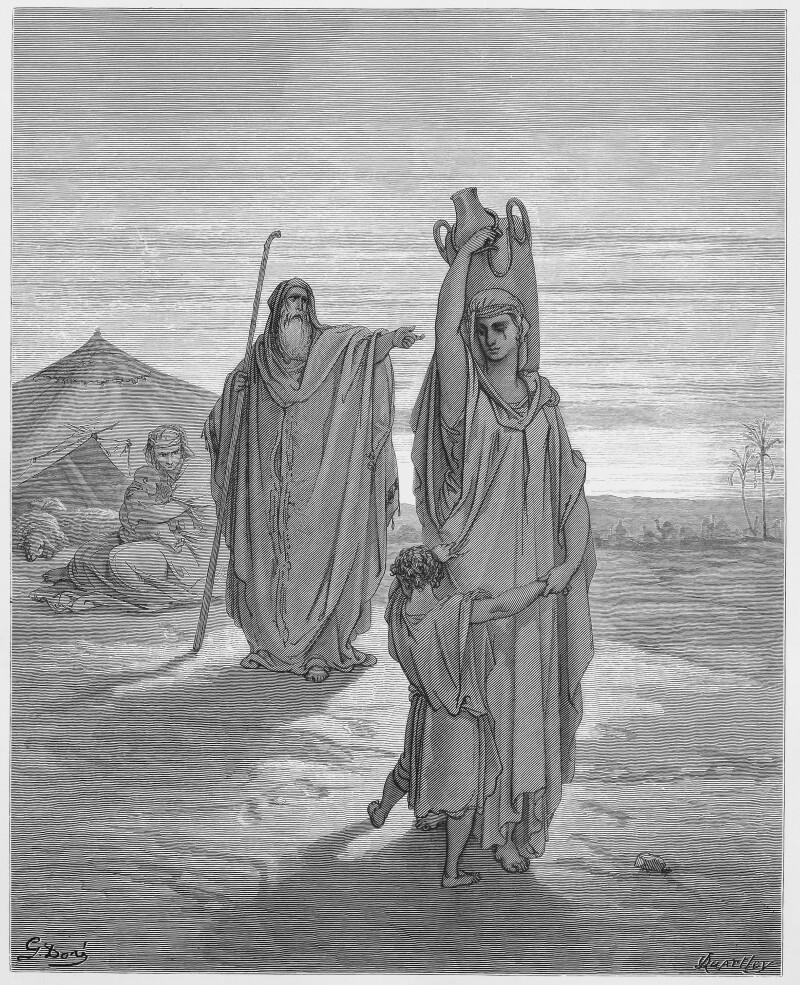When I think of important lessons I learn from the scriptures, prophets like Lehi, Nephi, Moroni, Moses, Noah, and Adam first come to mind. I love stories about prophets and the truths we learn from them. But when it comes to women in the scriptures, I have often felt that there are fewer examples to draw from. This is understandable—the scriptures were written in a different time and place, and so it’s unsurprising that we don’t know as much about the women from these time periods.
That being said, I wanted to take a deeper look at women in the scriptures and see what I could learn from them. Specifically, I wanted to research mothers in the scriptures—and I was shocked with how many I found. It’s impossible to cover them all here, but I hope this look at five mothers in the Old Testament can encourage us all to search more intentionally for women in the scriptures and appreciate what their important stories can teach us.
Eve
In his October 1987 general conference address, President Russell M. Nelson gave a talk during the women’s session called “Lessons from Eve.” Speaking of how Christ created the earth under the direction of Heavenly Father, President Nelson said:
“As Michael, Adam did his part. He became the first man. But, in spite of the power and glory of creation to that point, the final link in the chain of creation was still missing. All the purposes of the world and all that was in the world would be brought to naught without woman—a keystone in the priesthood arch of creation.”
President Nelson’s use of the word keystone here is significant, as that description is often used for the Book of Mormon to express its major part in the gospel of Jesus Christ. To better understand what a keystone is, let’s look at Merriam-Webster’s definition, which calls a keystone “the wedge-shaped piece at the crown of an arch that locks the other pieces in place.” To think of Eve this way is especially powerful. Without her, the “mother of all living” and the “first of all women” (Moses 4:26), the purpose of the world and everything in it would have crumbled. But as the central part of the arch, the creation relied on her, and because of her, the plan of salvation could move forward.
Eve’s example can show women today how integral they are to the plan of salvation. Whether they are single or married, or with or without children, there are many ways in which women can be the keystone of their own spheres. By being a support to those around them or the center upon which others can lean, women help God’s plan progress.
You may also like: Why did God give Adam and Eve contradictory commandments? Resolving ambiguity about the Fall
Hagar
Hagar was an Egyptian handmaid of Sarah who was given to Abraham to raise up seed unto him when Sarah was unable to bare children. When Hagar conceived, hard feelings arose between her and Sarah, and Hagar fled. In an LDS Living article, author Chelsea Hayden describes the scene:

“Right at this grim moment, when Hagar must’ve felt utterly unseen, Abraham’s God manifested Himself and explained that He’d heard her cries. The astonished handmaid—no longer invisible!—gave Him the name ‘the God who sees me.’”
Hayden points out that Hagar must have felt especially unseen as a servant, foreigner, female, and runaway, and that it was “doubtful she expected to find help while wandering that desolate wasteland.” And yet God did see her when she felt most invisible. In fact, not only did God see her, but He would later promise to make her son Ishmael “a great nation” (Genesis 21:18), which He did. Hagar’s story serves as a reminder today to trust God even when we feel as though we are wandering in our own personal deserts—and to believe that He will not only fulfill the promises He has made to us, but that He will do so to a greater scale than we can now imagine.
Sarah
Hebrews chapter 11 lists many people of great faith: Abel, Enoch, Noah, Abraham, Isaac, Jacob, Joseph, Moses, and Sarah. Sarah is one of two women mentioned in the chapter, along with the harlot Rahab, who helped hide two spies in Jericho and whose courage helped save her and her family when the city of Jericho fell. But what do the scriptures say about Sarah’s faith? In verse 11, we read:
“Through faith also Sara herself received strength to conceive seed, and was delivered of a child when she was past age, because she judged him faithful who had promised.”
It may be difficult for us to understand some of Sarah’s actions based on what is written about her in the scriptures. We know that she desired Hagar and her son to be cast out (Genesis 21:10) and that she laughed when she received news that she would bear a son (Genesis 18:12–15). But acknowledging the years of hurt she must have felt after being unable to have a child and the astonishment she must have experienced when learning she would finally have one, we can have compassion for Sarah and all that she went through. This is why Hebrews 11 is particularly meaningful, because we receive insight about her that we do not find elsewhere: all along, Sarah had the faith that she would have a child because she knew that God would fulfill His promises.
It may also be significant that Sarah is listed alongside many of the greatest prophets, showing not only that her faith was as great as theirs, but that the miracle she experienced was as remarkable as Moses parting the Red Sea or Enoch being translated. And if that weren’t enough to speak to the woman that Sarah was, we can look to the Hebrew meaning of her name: “princess.” Such a name is fitting for one who had faith that her King would give her the strength to bear a child when it seemed impossible. Sarah is an example of one who recognized her divine right as a daughter of a Heavenly King to receive the blessings that were promised her, reminding us that we can do the same.
Rebekah
Rebekah dealt with the unexpected again and again in her life. First, she consented to marry Isaac without having met him (Genesis 24:58). And then, despite being blessed to be “the mother of thousands of millions” (Genesis 24:60), she was unable to have children for nearly 20 years of her marriage.

Perhaps Rebekah’s situation was confusing or even troubling to her. Maybe after two long decades of waiting she questioned what her purpose was, or wondered if she would ever be a mother in her lifetime. And yet, Rebekah did eventually become pregnant with twins after her husband entreated the Lord in her behalf (Genesis 25:21). This was certainly a great blessing, but something was off about the situation—Rebekah found that those twins “struggled together within her,” and when she asked God why this was the case, He answered that the elder of the twins would serve the younger (Genesis 25:23).
Once more, Rebekah was faced with the unexpected. She likely didn’t think her children, Jacob and Esau, would be such at odds with each other, even from the womb—and after 20 years of waiting, this may have been difficult news to hear. Later, as they grew, she also felt “grief of mind” when her son Esau married outside of the covenant (Genesis 26:35). Rebekah’s experience as a mother was not always a straightforward path. But her motherhood wasn’t defined by that. Before she ever had children, when she first left her family, she had a glimpse of the fact that she was destined to be a mother with a great posterity. And perhaps that eternal perspective is what really kept her going when she didn’t know what was around the corner for her.
Rebekah’s life can serve as a reminder for us to likewise keep an eternal perspective through the ups and downs of our mortal experience. Her example can also help us remember to hold on to the plan God has in store for us when things do not turn out the way we anticipate.
Hannah
In 1 Samuel, we learn of the great grief Hannah felt at being unable to have a child. She fretted, wept, and could not eat because of her circumstance, and she was in a state of “bitterness of soul” (1 Samuel 1:10).
You may also like: Depression, infertility, and faith: Lessons from Hannah in the Old Testament
Praying to the Lord, Hannah vowed that if He would give her a son, she would give him back to the Lord “all the days of his life” (verse 10). Hannah’s prayers were answered in the way that she hoped, and—perhaps in equal significance—Hannah also fulfilled the promise she had made to God. It must have been incredibly difficult for her to give up her child when she had longed for him for so long, and yet she did so anyway because she had promised the Lord that she would. Perhaps she could have come up with an excuse or changed her mind about the matter, but she didn’t. Hannah is a reminder to us of what it means to keep our promises, and most especially our covenants, with God. She is also an example of what it means to truly sacrifice and to put our faith in God first above all else.


